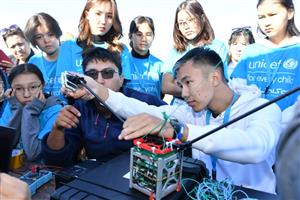- Main page
- News
KAZNU LAUNCHED TWO NANOSATELLITES IN TURKESTAN
10/3/2022
Two ultramodern nanosatellites of Al-Farabi Kazakh National University were launched into the upper atmosphere 50 kilometers away from Turkestan. This experimental test took place as part of the opening of the UniSat educational hub in partnership with Kazakhstan-UNICEF.
UniSat is a joint educational program of Al–Farabi Kazakh National University and Kazakhstan-UNICEF. Its goal is to develop the knowledge and skills of women in the field of nanosatellite development, as well as to improve skills such as teamwork, public speaking, time management and creativity. The program is aimed at eliminating gender stereotypes and unequal representation of girls in STEAM education.
"The UniSat KazNU satellites are developed for educational purposes and belong to the class of small spacecraft weighing from 1 to 10 kg. They are equipped with several cameras and sensors. Receivers collect data on temperature, pressure, humidity. They also measure air pollution, determine the concentrations of microparticles PM2.5 and PM10, which are considered very dangerous for the human body," project coordinator – General Director of the cluster of Engineering and High Technologies of KazNU Amirkhan Temirbayev commented.
Before launching the satellite, the participants on their own programmed and tested the subsystems of UniSat nanosatellites in laboratory conditions. They gained knowledge about the skills of 3D modeling, designing software control units, software and hardware development.
As a result, under the guidance of KazNU scientists, the participants learned how to process data obtained from a nanosatellite. They also mastered data visualization and were able to compile the final mission report.
During the analysis of the data, it was found that the indicator of the air content in the territory of the city of Turkestan by microparticles is not higher than the indicators recommended by the World Health Organization. To be precise, the indicator of the PM2.5 sensor did not exceed the average daily norm. These data obtained from nanosatellites can be used for scientific and practical purposes.
Next, KazNU scientists held a practical master class for physics teachers of the Turkestan region on the technology of balloon-probe flight into the upper atmosphere. They learned to calculate in advance the trajectory of the ball probes and the place of its landing.
To its credit, KazNU named after al-Farabi has two launched nanosatellites of the al-Farabi series. The second nanosatellite launched in 2018 by Elon Musk's company SpaceX is still operating normally. UniSat satellites launched into the atmosphere are engineering models that are being tested. Previously, they were tested in the Almaty region, Navoi region of Uzbekistan. KazNU scientists improving the project, plan to launch the UniSat satellite into space in the future. The cluster of Engineering and High-tech technologies of KazNU has specialized research equipment for conducting applied and fundamental research in the field of space technologies, remote sensing of the Earth, as well as the development of nanosatellites.
By the way, KazNU as a part of the Global hub of the UN Academic Impact Program on Sustainable Development, actively engages the world academic community in the implementation of 17 goals of sustainable human development aimed at preserving the planet's resources, ensuring access to quality education and well-being, innovation development, ecosystem conservation, etc. The next result of the university in implementing the principles of sustainable development was the joint educational program of UNICEF Kazakhstan and Al-Farabi Kazakh National University – UniSat.
Press Service of Al-Farabi Kazakh National University

